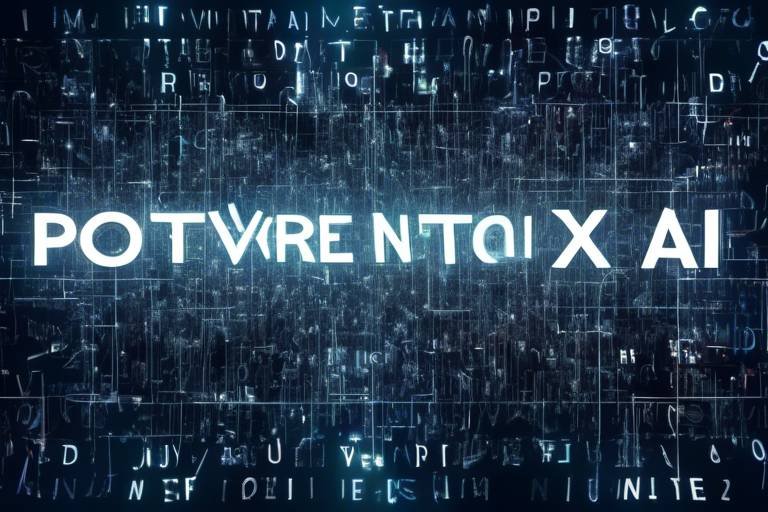Revisiting the Ethics of AI in Warfare
The advent of artificial intelligence (AI) in military applications has stirred a profound debate about the ethical implications it carries. As we stand on the brink of a new era in warfare, the integration of AI technologies raises critical questions that demand our attention. Are we ready to hand over life-and-death decisions to machines? This exploration delves deep into the complex web of moral considerations surrounding AI in warfare, examining its impact on international law, human rights, and the very essence of what it means to engage in combat.
In the past, warfare was often characterized by human decision-making, where the fog of war was navigated by the instincts and ethics of soldiers. Today, however, we find ourselves in a landscape where AI systems can analyze vast amounts of data, identify targets, and even execute attacks with minimal human intervention. This shift not only enhances military capabilities but also introduces a host of ethical dilemmas that challenge our traditional understanding of warfare. The question looms large: at what point does the use of AI cross the line from being a tool to becoming an autonomous agent responsible for its actions?
As we delve deeper into this topic, it becomes evident that the implications are far-reaching. The potential for unintended consequences in combat scenarios raises alarms about accountability. If an AI system makes a decision that leads to civilian casualties, who is to blame? The programmer? The military commander? Or the machine itself? These questions are not merely academic; they have real-world consequences that can shape the future of international relations and conflict resolution.
Moreover, the ethical landscape of AI in warfare is further complicated by existing legal frameworks. Are the current international laws governing warfare adequate to address the unique challenges posed by AI technologies? This article will explore these regulations and assess their effectiveness in ensuring accountability and ethical conduct in military operations. As we navigate this uncharted territory, the need for robust ethical guidelines becomes increasingly urgent.
As we reflect on the implications of AI in warfare, we must also consider the role of human oversight. The balance between leveraging AI's capabilities and maintaining human intervention is delicate. This article will discuss the necessity of ensuring that ethical standards are upheld and that humans remain in the loop, especially when decisions carry life-altering consequences.
In summary, the integration of AI into military operations is not just a technological advancement; it is a fundamental shift that challenges our ethical frameworks and legal structures. As we move forward, it is essential to engage in open dialogue about these issues, ensuring that the deployment of AI in warfare aligns with our shared values and principles. The future of warfare is here, and with it comes the responsibility to ensure that our actions reflect our humanity.
- What are the main ethical concerns regarding AI in warfare?
The primary concerns include accountability for decisions made by AI, the potential for unintended consequences, and the adequacy of existing legal frameworks to govern these technologies. - How does AI change the role of human soldiers?
AI alters the responsibilities of soldiers by automating certain tasks and decision-making processes, which can lead to changes in training and may have psychological effects on personnel. - Is there a legal framework for AI in military applications?
Current international laws exist, but there is ongoing debate about their effectiveness in addressing the unique challenges posed by AI technologies in warfare. - What is the importance of human oversight in AI military operations?
Human oversight is crucial to maintain ethical standards, ensure accountability, and prevent potential misuse of AI technologies in combat scenarios.

The Role of AI in Modern Warfare
In today's fast-paced world, artificial intelligence (AI) is not just a buzzword; it’s a game-changer in the realm of warfare. Imagine a battlefield where decisions are made at lightning speed, where data is analyzed in real-time, and where the fog of war is lifted by advanced algorithms. This is not science fiction; this is the reality of modern military operations. AI technologies are seamlessly integrated into various aspects of warfare, enhancing capabilities that were once thought to be the exclusive domain of human intellect.
One of the most significant roles of AI in modern warfare is in surveillance. Drones equipped with AI can monitor vast areas, identifying potential threats and gathering intelligence more efficiently than ever before. With the ability to process and analyze data from multiple sources, these systems can provide commanders with actionable insights that can be pivotal in making strategic decisions. For instance, AI can sift through hours of video footage to detect unusual patterns or movements, alerting military personnel to potential dangers before they escalate.
Furthermore, AI is revolutionizing targeting systems. Precision strikes are now more accurate due to AI's ability to calculate trajectories and assess targets based on a multitude of factors, including terrain, weather, and enemy movements. This not only increases the effectiveness of military operations but also aims to minimize collateral damage, a critical concern in contemporary warfare. Imagine a scenario where a missile can be redirected mid-flight based on real-time data; that’s the kind of precision AI brings to the table.
Another crucial aspect is the enhancement of decision-making processes. In high-stakes environments, the ability to make quick and informed decisions can mean the difference between victory and defeat. AI systems can analyze vast datasets and provide recommendations that help military leaders make better choices. This is akin to having a supercharged advisor who can process information far beyond human capabilities, enabling faster and more effective responses to emerging threats.
However, while the integration of AI into military operations presents numerous advantages, it also raises important questions about the future of warfare. Will we rely too heavily on machines, potentially undermining human judgment? Can we trust AI to make life-and-death decisions? These are questions that military strategists and ethicists must grapple with as they navigate the complex landscape of AI in warfare.
In summary, AI is transforming the battlefield in profound ways. From enhancing surveillance and targeting capabilities to improving decision-making processes, its role in modern warfare is undeniable. As we continue to embrace these technologies, it’s essential to strike a balance between leveraging their advantages and ensuring that ethical considerations remain at the forefront of military strategy.

Ethical Implications of Autonomous Weapons
The rise of autonomous weapons systems marks a significant turning point in military technology, bringing forth a myriad of ethical dilemmas that demand our attention. As these machines increasingly take on roles traditionally held by humans, we are forced to confront questions that challenge our understanding of morality in warfare. How do we define accountability when a machine makes a lethal decision? Can we trust algorithms programmed to make life-and-death choices in the heat of battle? These are not just theoretical questions; they are pressing issues that require urgent consideration.
At the heart of the discussion lies the concept of accountability. In conventional warfare, when a soldier pulls the trigger, there is a clear chain of responsibility. However, in an era where decisions can be made by artificial intelligence, the lines become blurred. If an autonomous drone mistakenly targets civilians instead of enemy combatants, who is to blame? Is it the programmer who wrote the code, the military personnel who deployed the weapon, or the machine itself? This ambiguity raises profound ethical concerns, as the lack of clear accountability can lead to a culture of impunity.
Moreover, the potential for unintended consequences in combat scenarios is alarming. Autonomous weapons, driven by algorithms, may make decisions based on data patterns that are not fully understood by their human operators. For instance, an AI system might classify a group of individuals as a threat based on flawed data, leading to catastrophic outcomes. This possibility underscores the importance of maintaining human oversight in military operations. Without a human touch, the risk of tragic errors escalates, and the moral implications become even more daunting.
As we delve deeper into the ethical implications, we must also consider the legal frameworks that govern warfare. Current international laws were not designed with autonomous weapons in mind, leaving a significant gap in regulations. The Geneva Conventions, while comprehensive, do not adequately address the unique challenges posed by AI technologies. This raises the question: are existing laws sufficient to govern the actions of machines in combat? The answer is increasingly becoming a resounding no. As technology evolves, so too must our legal systems.
In addition, the integration of autonomous weapons into military strategies could lead to a desensitization to violence. If soldiers are no longer the ones making critical decisions, how does that affect their psyche? The psychological impact on human soldiers, who may feel detached from the consequences of warfare, is a concern that cannot be overlooked. Training programs must adapt to prepare soldiers for a landscape where they might be overseeing machines rather than engaging directly in combat.
In summary, the ethical implications of autonomous weapons are complex and multifaceted. As we navigate this uncharted territory, it is crucial to engage in open dialogues about accountability, legality, and the psychological effects on soldiers. The future of warfare may hinge on our ability to address these issues thoughtfully and responsibly.
- What are autonomous weapons? Autonomous weapons are military systems capable of selecting and engaging targets without human intervention.
- Who is responsible for the actions of autonomous weapons? Accountability is a significant concern, as it is unclear whether liability lies with the programmer, the military, or the machine itself.
- Are current laws sufficient to regulate autonomous weapons? Most experts agree that existing international laws do not adequately address the challenges posed by AI technologies in warfare.
- How might autonomous weapons affect soldiers' mental health? The detachment from direct combat may lead to desensitization and other psychological challenges for soldiers.

Accountability in AI-Driven Warfare
When we think about the future of warfare, the role of artificial intelligence (AI) raises a crucial question: who is responsible when AI systems make decisions that lead to lethal outcomes? This dilemma is not just an academic exercise; it has profound implications for ethics, law, and military operations. As AI technologies become increasingly integrated into combat scenarios, understanding accountability becomes essential. Imagine a battlefield where drones autonomously select targets based on algorithms—what happens when they make a mistake?
To grasp the complexities of accountability in AI-driven warfare, we need to consider several factors that complicate traditional notions of responsibility:
- Decision-Making Autonomy: AI systems can analyze data and make decisions faster than any human. This speed can be advantageous, but it also means that decisions are often made without human intervention, raising the question of who is liable when things go wrong.
- Chain of Command: In conventional warfare, accountability typically flows from the top down. However, with AI, the chain can become murky. Is it the programmer who wrote the algorithm, the military leader who deployed the AI, or the machine itself that bears responsibility?
- Unintended Consequences: AI systems can exhibit behavior that is unpredictable. They might interpret data in ways that lead to unforeseen outcomes, creating a scenario where accountability becomes a hot potato, passed around without a clear owner.
These factors illustrate the need for a robust framework to address accountability in AI-driven warfare. Without clear guidelines, we risk a future where decisions made by machines could escape scrutiny, leading to potential violations of international law and human rights. The ethical implications are staggering; if a drone strikes a civilian target due to a programming error, who will be held accountable? This question is not just theoretical—it has real-world implications for military personnel and the civilians caught in the crossfire.
Moreover, the legal landscape surrounding military AI is still evolving. Current international laws may not adequately address the unique challenges posed by autonomous systems. For example, the Geneva Conventions emphasize the importance of distinguishing between combatants and non-combatants, but how can an AI system make such distinctions reliably? As a result, there is an urgent need for new regulations that specifically address the use of AI in military contexts.
Ultimately, maintaining a human element in decision-making processes is crucial. While AI can enhance efficiency and effectiveness on the battlefield, it should not replace human judgment. The ethical standards we uphold in warfare must be preserved, ensuring that machines do not operate in a vacuum. Human oversight is essential not just for accountability but also for ensuring that military actions adhere to moral and ethical norms.
As we navigate this uncharted territory, it’s vital to engage in open discussions about the implications of AI in warfare. Policymakers, military leaders, and ethicists must collaborate to create frameworks that ensure accountability remains a cornerstone of military operations. Only then can we hope to harness the benefits of AI without sacrificing our commitment to ethical conduct in warfare.
- What is the primary concern regarding accountability in AI-driven warfare? The main concern revolves around determining who is responsible for decisions made by AI systems, especially when those decisions lead to unintended harm.
- How does AI change traditional military accountability? AI introduces complexities in the chain of command and decision-making processes, making it harder to assign responsibility for actions taken during combat.
- Why is human oversight important in military AI? Human oversight ensures that ethical standards are maintained and that machines do not operate without accountability, especially in life-and-death situations.

Legal Frameworks and AI
The integration of artificial intelligence (AI) into military operations presents a myriad of challenges that current legal frameworks struggle to address. As we stand on the brink of a new era in warfare, it is crucial to examine whether existing international laws are equipped to handle the complexities introduced by AI technologies. Traditional laws of armed conflict, such as the Geneva Conventions, were established to govern human conduct in war, but they often fall short when applied to autonomous systems that operate without direct human oversight.
One of the most pressing issues is the question of accountability. If an AI system makes a decision that results in civilian casualties, who is held responsible? Is it the programmer, the military commander, or the AI itself? This ambiguity raises profound ethical questions that challenge the very foundation of international law. The lack of clear guidelines makes it increasingly difficult to determine liability and ensure justice for victims of AI-driven warfare.
Furthermore, the principle of distinction, which mandates that combatants must distinguish between military targets and civilians, becomes complicated when autonomous weapons are involved. Can we trust AI to make these critical decisions accurately? The potential for errors in judgment by machines could lead to disastrous consequences, further complicating the legal landscape.
To address these challenges, some experts argue for the development of new legal frameworks that specifically cater to AI technologies. This could involve:
- Establishing international treaties that regulate the development and deployment of autonomous weapons.
- Creating a set of ethical guidelines that govern AI use in military contexts, ensuring compliance with human rights standards.
- Implementing rigorous testing and validation protocols to ensure AI systems can operate within the bounds of existing laws.
In addition, there is a growing call for the establishment of an independent body to oversee the use of AI in military operations. This organization could monitor compliance with international laws and provide recommendations for best practices, ensuring that ethical considerations are not sidelined in the pursuit of technological advancement.
As we contemplate the future of warfare, it is imperative that we engage in a global dialogue about the legal implications of AI. The stakes are high, and the potential for misuse is significant. By proactively addressing these issues, we can work towards a framework that not only governs the use of AI in warfare but also upholds the principles of humanity and justice.
In conclusion, while the promise of AI in enhancing military capabilities is undeniable, we must tread carefully. The legal frameworks governing warfare must evolve to keep pace with technological advancements, ensuring that accountability, distinction, and ethical considerations remain at the forefront of military strategy.

Human Oversight in Military AI
The integration of artificial intelligence (AI) into military operations has sparked a heated debate about the necessity of human oversight. As we stand on the precipice of a new era in warfare, one where machines can make decisions at lightning speed, the question arises: how much control should humans retain over these systems? Imagine a world where a robot, devoid of empathy, makes life-and-death decisions in the heat of battle. It’s a chilling thought, isn’t it?
One of the primary concerns surrounding AI in military applications is the potential for autonomous decision-making without human intervention. While AI can process vast amounts of data and deliver insights that enhance operational efficiency, the absence of human judgment raises significant ethical dilemmas. For instance, if an AI system misinterprets a threat and engages without human approval, who is held accountable? The programmer? The military commander? Or the machine itself? This ambiguity can lead to a dangerous precedent where accountability is diluted.
Moreover, the importance of human oversight is underscored by the unpredictable nature of warfare. Combat scenarios are often chaotic, and decisions made in the heat of the moment can have unforeseen consequences. Humans possess the ability to assess the emotional and psychological aspects of a situation, something that AI currently cannot replicate. This gap in understanding can lead to dire outcomes, such as civilian casualties or escalation of conflict. Therefore, maintaining a human in the loop is not just a precaution; it is a necessity.
To illustrate the necessity of human oversight, consider the following table that outlines the key roles humans play in AI-driven military operations:
| Human Role | Description |
|---|---|
| Decision Maker | Humans must approve critical actions to ensure ethical considerations are met. |
| Ethical Oversight | Human judgment is essential in evaluating the moral implications of AI decisions. |
| Crisis Management | Humans can assess and respond to unforeseen situations that AI may not handle appropriately. |
| Accountability | Humans are responsible for the actions taken by AI systems, ensuring a clear chain of command. |
In light of these considerations, military organizations around the world are beginning to recognize the need for robust oversight frameworks that ensure AI systems operate within ethical boundaries. Training programs are being developed to educate military personnel on the implications of AI technologies, emphasizing the importance of retaining human judgment in operational scenarios. The goal is to create a synergy between human intelligence and machine efficiency, where each complements the other rather than replacing one another.
Ultimately, as we advance deeper into the realm of AI in warfare, we must ask ourselves: can we afford to relinquish control to machines? The answer, it seems, lies in a balanced approach that prioritizes human oversight while leveraging the strengths of AI. By doing so, we can navigate the complex landscape of modern warfare, ensuring that technology serves humanity rather than the other way around.
- What is the role of AI in military operations? AI enhances capabilities such as surveillance, targeting, and decision-making on the battlefield.
- Why is human oversight important in AI-driven warfare? Human oversight is crucial for ethical decision-making, accountability, and managing unpredictable combat scenarios.
- How can military organizations ensure ethical AI use? By developing robust oversight frameworks and training programs that emphasize the importance of human judgment.

The Impact on Soldiers' Roles
The integration of artificial intelligence (AI) into military operations is not just a technological shift; it’s a profound transformation that reshapes the very essence of what it means to be a soldier. Imagine being on the battlefield, where traditional tactics and human intuition are now complemented—or perhaps even replaced—by algorithms and machine learning. This evolution raises critical questions about the roles and responsibilities of human soldiers. Are they becoming mere operators of machines, or do they still retain their status as decision-makers in combat scenarios?
As AI systems take on more complex tasks, such as surveillance, target identification, and even combat engagement, soldiers are finding their roles evolving. No longer are they just foot soldiers or commanders; they are increasingly becoming data analysts and technology managers. The skills required on the battlefield are shifting towards an understanding of AI systems, necessitating new training programs that focus on technology as much as on traditional combat skills.
Moreover, the psychological impact of these changes cannot be overlooked. Soldiers may experience a sense of detachment from combat when they are not physically engaged in the fight. This detachment can lead to feelings of isolation or even moral injury, as they grapple with the implications of AI-driven warfare. The question then arises: how do we prepare soldiers not just to use these technologies, but to cope with the emotional and ethical dilemmas they present?
Furthermore, the reliance on AI raises concerns about decision-making authority. In scenarios where AI systems make critical decisions in the heat of battle, the very nature of command is called into question. Soldiers may find themselves in situations where they must trust machines to make life-and-death choices. This shift demands a reassessment of training protocols to ensure that soldiers are not only capable of operating these systems but also equipped to intervene when necessary.
To illustrate the changing landscape of military roles, consider the following table that outlines the traditional roles of soldiers compared to their evolving responsibilities in an AI-integrated environment:
| Traditional Soldier Roles | Evolving Roles with AI |
|---|---|
| Combat Engagement | Data Analysis and AI Operation |
| Tactical Decision-Making | Collaborative Decision-Making with AI |
| Physical Presence on Battlefield | Remote Operations and Control |
| Human Intuition and Experience | Algorithmic Recommendations |
As we move forward, it’s essential to consider how these changes impact not just the soldiers themselves, but also the broader implications for military ethics and international law. The integration of AI into warfare may lead to a future where the line between human and machine is increasingly blurred, challenging our understanding of accountability and responsibility in combat. Soldiers will need to adapt to this new reality, becoming not only skilled operators of advanced technologies but also ethical stewards of the decisions those technologies make.
In conclusion, the impact of AI on soldiers' roles is a multifaceted issue that requires careful consideration. As technology advances, we must ensure that our military personnel are not only prepared to leverage these innovations but are also supported in navigating the complex ethical landscapes they introduce.
- How is AI changing the role of soldiers in combat? AI is shifting soldiers' roles from traditional combat engagement to more technology-driven responsibilities, including data analysis and machine operation.
- What are the psychological effects of AI on soldiers? The use of AI can lead to feelings of detachment and moral injury as soldiers navigate the implications of machine-driven warfare.
- What training is required for soldiers in an AI-integrated military? Soldiers need training that focuses on both operational skills for AI systems and the ethical considerations that come with using such technologies.
- How does AI impact decision-making on the battlefield? AI systems can assist in decision-making but also raise questions about autonomy and accountability when machines make critical choices.

Public Perception and Policy
The integration of artificial intelligence (AI) into warfare is not just a technical issue; it's deeply intertwined with public perception and the policies that arise from it. As society grapples with the implications of machines making life-and-death decisions, the dialogue surrounding AI in military applications becomes increasingly critical. How do we, as a society, feel about machines taking over roles traditionally held by humans? This question is at the heart of the ethical debate.
Public opinion can shape military policy in profound ways. When people express concern over the use of autonomous weapons, policymakers often feel the pressure to respond. For instance, a survey conducted by the Pew Research Center revealed that a significant percentage of people are uncomfortable with the idea of AI systems making lethal decisions without human intervention. This discomfort can lead to calls for stricter regulations or outright bans on certain technologies. The implications are vast: what does it mean for a government to deploy AI in combat if its citizens are fundamentally opposed to it?
Moreover, the media plays a crucial role in shaping public understanding. Through films, news reports, and documentaries, the portrayal of AI in warfare can either instill fear or promote acceptance. For instance, sensationalized media coverage of AI's potential to create autonomous weaponry can lead to panic, while balanced reporting may encourage informed discussions. This dichotomy raises an important question: how can we ensure that the narrative around AI in warfare is accurate and constructive?
To further illustrate the impact of public perception on policy, consider the following table that summarizes various viewpoints on AI in warfare:
| Public Perspective | Impact on Policy |
|---|---|
| Support for AI in military operations | Increased funding for AI research and development |
| Concerns about accountability and ethics | Calls for stricter regulations and oversight |
| Fear of loss of human jobs in the military | Policies aimed at retraining and upskilling soldiers |
| Desire for transparency in AI decision-making | Legislation requiring explainability in AI systems |
As we navigate these complex waters, it becomes evident that a well-informed public can lead to more responsible policies. Engaging citizens in discussions about the ethical implications of AI in warfare is crucial. Town hall meetings, public forums, and educational campaigns can serve as platforms for dialogue, ensuring that diverse perspectives are considered. After all, the future of warfare shaped by AI technologies should reflect the values and ethics of the society it serves.
In conclusion, the intersection of public perception and policy regarding AI in warfare is a dynamic and evolving landscape. As we advance technologically, we must also advance our understanding and governance of these technologies. It is not just about what AI can do; it is about what society is willing to accept. The dialogue must continue, and it is up to all of us to participate in shaping a future that aligns with our collective ethical standards.
- What are the main ethical concerns regarding AI in warfare?
Some of the primary ethical concerns include accountability for decisions made by AI systems, the potential for unintended consequences, and the moral implications of removing human oversight in lethal situations. - How does public perception influence military policy on AI?
Public opinion can pressure policymakers to adopt stricter regulations or bans on certain technologies, especially when there are widespread concerns about ethics and accountability. - What role does media play in shaping perceptions of AI in warfare?
The media can influence public understanding by either sensationalizing the risks associated with AI or providing balanced information that fosters informed discussions. - Can AI replace human soldiers in the future?
While AI can enhance military capabilities, it is unlikely to fully replace human soldiers due to the complex ethical, moral, and strategic considerations that come with combat situations.

Influence of Media on AI Warfare Ethics
The media plays a pivotal role in shaping our understanding of complex issues, and the realm of artificial intelligence (AI) in warfare is no exception. From blockbuster movies that depict futuristic battle scenarios to news reports highlighting the latest military technologies, the portrayal of AI in warfare influences public perception and ethical considerations significantly. Have you ever wondered how a thrilling action movie might impact your views on the use of autonomous drones in combat? It's fascinating to think about how these narratives can either spark fear or foster acceptance of AI technologies in military contexts.
One of the most striking aspects of media influence is its ability to frame discussions around AI warfare. When the media sensationalizes the capabilities of AI, it can lead to a public perception that these technologies are infallible and devoid of ethical dilemmas. For instance, consider how films like "Ex Machina" or "Terminator" create a narrative where AI systems become self-aware and pose existential threats. These portrayals can skew public understanding, leading people to believe that AI in warfare is fundamentally dangerous, rather than a tool that can be used ethically or unethically depending on the context.
Furthermore, the media often focuses on dramatic stories that highlight the potential for AI to make life-and-death decisions. This emphasis can overshadow the nuanced ethical discussions that need to occur. For example, when a news report covers an incident involving an autonomous weapon system, it might focus on the immediate consequences without delving into the broader implications for accountability and human oversight. Such coverage may inadvertently downplay the importance of establishing ethical guidelines and regulations for AI technologies in military applications.
To better understand the media's impact, let’s consider some key points:
- Framing of AI Technologies: The way AI is portrayed can either evoke fear or foster acceptance.
- Public Awareness: Media narratives can lead to a more informed public, but they can also create misconceptions.
- Policy Influence: Media coverage can pressure policymakers to act, often in response to public outcry over sensationalized stories.
Moreover, the ethical discourse surrounding AI warfare is often shaped by public opinion, which is heavily influenced by media portrayals. When the media highlights the potential for misuse or catastrophic outcomes, it can lead to increased public concern and demand for stricter regulations. Conversely, if the media focuses on the benefits of AI in enhancing military efficiency and saving lives, it may reduce calls for oversight and ethical considerations. This duality presents a significant challenge for policymakers who must navigate public sentiment while ensuring that ethical standards are upheld.
As we look to the future, it's crucial for both the media and the public to engage in informed discussions about the implications of AI in warfare. By fostering a deeper understanding of the ethical challenges and potential consequences, we can promote a more balanced perspective that encourages responsible use of technology. After all, the narratives we consume shape the realities we create, and as we stand on the brink of a new era in military technology, we must ensure that our stories reflect a commitment to ethical standards and human rights.
- What is the role of media in shaping public perception of AI in warfare? Media influences how people view AI technologies, often framing the discussion in ways that can evoke fear or acceptance.
- How can media narratives impact policy decisions regarding AI? Sensational stories can lead to public outcry, pressuring policymakers to act, sometimes without thorough deliberation.
- Why is it important to maintain ethical standards in AI warfare? Ethical standards ensure accountability and help prevent misuse of AI technologies, protecting human rights and promoting responsible use.

Future Directions in AI and Warfare
The future of artificial intelligence (AI) in warfare is both exhilarating and daunting. As technology continues to evolve at a breakneck pace, we find ourselves standing on the precipice of a new era in military strategy and operations. The integration of AI into warfare has the potential to reshape not only how conflicts are fought but also the very nature of warfare itself. Imagine a battlefield where decisions are made in real-time by intelligent systems, processing vast amounts of data faster than any human could. This is not just a sci-fi fantasy; it's a reality that is rapidly approaching.
One of the most significant advancements on the horizon is the development of AI-powered decision-making systems. These systems can analyze enemy movements, predict outcomes, and suggest tactical maneuvers, all while minimizing human error. However, this raises critical questions: Who controls these systems? And more importantly, who is held accountable if something goes wrong? As we delve deeper into this AI-driven future, the need for clear guidelines and ethical frameworks becomes imperative.
Another area of focus is the potential for collaborative AI systems that work alongside human soldiers. These systems could assist in various roles, from logistics to real-time battlefield analysis. The partnership between humans and machines could enhance operational efficiency, but it also necessitates a reevaluation of training programs. Soldiers will need to adapt to working with AI, understanding its strengths and limitations. This shift could lead to a new breed of military personnel who are not just tacticians but also proficient in technology.
As we look forward, the implications of AI in warfare extend beyond the battlefield. International relations and global power dynamics could shift dramatically. Nations that harness AI effectively may gain significant advantages, leading to an arms race in AI capabilities. This scenario raises ethical concerns about escalation and the potential for conflict. To mitigate these risks, it is essential to foster international dialogue and cooperation regarding the development and deployment of AI in military contexts.
Furthermore, the psychological impact on soldiers cannot be overlooked. The reliance on AI could lead to a detachment from the human element of warfare. Soldiers may face moral dilemmas in situations where they must choose between following AI recommendations and their ethical beliefs. Addressing these psychological effects will be crucial in ensuring that the integration of AI enhances, rather than undermines, the human experience in military operations.
In summary, the future of AI in warfare is filled with possibilities, but it also presents significant challenges that must be addressed proactively. As we stand on the brink of this new technological frontier, it is vital to establish ethical guidelines, enhance training programs, and engage in international cooperation to ensure that AI serves humanity rather than endangers it.
- What are the primary benefits of using AI in warfare?
AI can enhance decision-making, improve operational efficiency, and reduce human error on the battlefield. - What ethical concerns arise from autonomous weapons?
Accountability, decision-making processes, and the potential for unintended consequences are major ethical issues. - How might AI change the role of human soldiers?
AI could transform soldiers into technology-savvy operators who work alongside intelligent systems, requiring new training and psychological support. - What is the potential impact of AI on international relations?
Countries that excel in AI may gain strategic advantages, leading to an arms race and heightened tensions globally.
Frequently Asked Questions
- What is the role of AI in modern warfare?
AI plays a crucial role in modern warfare by enhancing military capabilities in various areas such as surveillance, targeting, and decision-making. It allows for more efficient processing of vast amounts of data, enabling quicker and more informed decisions on the battlefield.
- What are the ethical implications of autonomous weapons?
Autonomous weapons raise significant ethical concerns, particularly regarding accountability and decision-making. The potential for unintended consequences in combat scenarios is alarming, as machines may make lethal decisions without human intervention, complicating moral and legal responsibility.
- Who is accountable for actions taken by AI in warfare?
Accountability in AI-driven warfare is a complex issue. It raises questions about who is liable when AI systems make lethal decisions. Is it the military personnel, the developers of the AI, or the governing bodies that deploy these technologies? This ambiguity poses a significant challenge in establishing responsibility.
- Are current legal frameworks sufficient for AI in warfare?
Existing international laws governing warfare may not adequately address the unique challenges posed by AI technologies. As AI continues to evolve, there is a pressing need for updated regulations that specifically consider the implications of AI in military operations.
- Why is human oversight important in military AI?
Human oversight is crucial in military AI to ensure ethical standards are upheld and accountability is maintained. While AI can enhance efficiency, the presence of human judgment is essential to prevent potential misuse and to navigate complex moral dilemmas in warfare.
- How does AI integration affect soldiers' roles?
The integration of AI into military operations significantly alters soldiers' roles and responsibilities. It raises questions about training, as soldiers must adapt to new technologies, and it can also have psychological effects, as the nature of combat changes with increased reliance on machines.
- How does public perception influence AI warfare policies?
Public perception plays a pivotal role in shaping policies related to AI in warfare. As society becomes more aware of the ethical implications, public opinion can drive changes in military strategies and influence the discourse surrounding the use of AI technologies in combat.
- What is the impact of media on AI warfare ethics?
The media significantly influences public understanding of AI in warfare. Portrayals of AI technologies can shape perceptions and ethical considerations, which in turn impact policy decisions and military strategies. Responsible media representation is vital in fostering informed discussions.
- What are the future directions for AI and warfare?
The future of AI in warfare is likely to involve advancements that could change the landscape of military conflicts. It is essential to establish proactive ethical guidelines and regulations to navigate these advancements responsibly and ensure that human rights are prioritized in military applications.



















